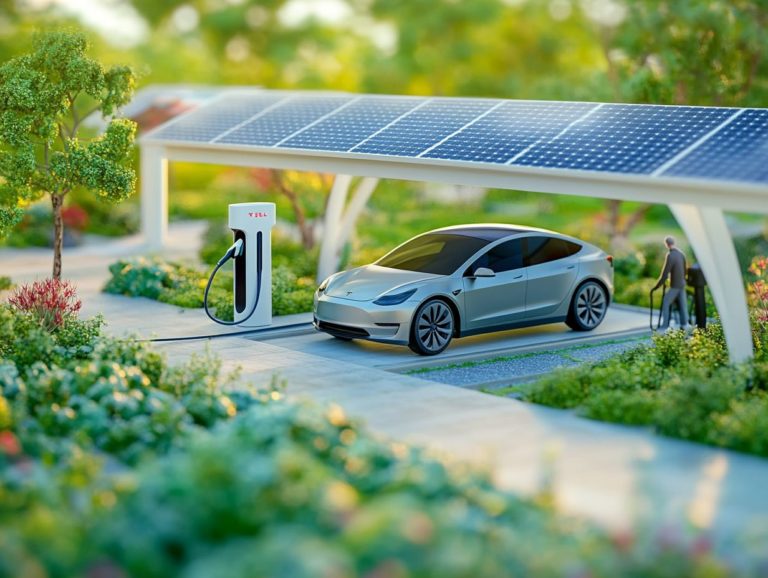Electric Vehicle Grants: Funding Sustainable Choices
Electric vehicle grants offer exciting benefits that can transform how we travel while easing some of your financial burdens.
These grants facilitate the shift towards cleaner transportation and provide substantial environmental and cost-saving advantages.
In this article, you ll explore what electric vehicle grants entail, who qualifies, the application process, and alternative funding options that can help you steer towards a more sustainable future.
Discover how you can leverage these resources to your benefit.
Contents
- Key Takeaways:
- Benefits of Electric Vehicle Grants
- Eligibility for Electric Vehicle Grants
- How to Apply for Electric Vehicle Grants
- Other Ways to Fund Sustainable Choices
- Frequently Asked Questions
- What are electric vehicle grants and how do they contribute to sustainable choices?
- Who is eligible for electric vehicle grants?
- What types of electric vehicles are eligible for grants?
- How can I apply for electric vehicle grants?
- What are the benefits of electric vehicle grants?
- Are there any limitations to electric vehicle grants?
Key Takeaways:
- Electric vehicle grants help individuals and businesses switch to sustainable transportation.
- These grants benefit the environment and save money through tax incentives.
- Eligibility varies, so it’s essential to understand the application process.
What are Electric Vehicle Grants?
Electric Vehicle Grants are your ticket to financial assistance designed to encourage the adoption and development of electric vehicles (EVs) and their supporting infrastructure. These grants typically spring from federal funding sources eager to back clean energy initiatives essential elements of modern transportation projects focused on boosting energy efficiency, cutting carbon emissions, and investing in sustainable alternatives.
With these grants, you could secure funding to implement EV charging stations (locations where electric vehicles can recharge) and develop electric fleet solutions, ultimately strengthening energy security and facilitating the transition to zero-emission vehicles.
These programs are vast and varied, creating opportunities for individuals, businesses, and local governments alike. Their objectives include increasing the number of charging stations and supporting the growth of electric vehicle technology, as well as modernizing public transit systems.
Eligibility criteria can differ significantly, often hinging on factors like geographic location, the nature of proposed projects, and alignment with federal objectives found in legislation like the Bipartisan Infrastructure Law and the Inflation Reduction Act. Importantly, these grants offer remarkable potential for rural communities, where improved public transportation and charging infrastructure can revolutionize mobility, diminish reliance on fossil fuels, and fuel economic growth in underserved areas.
Benefits of Electric Vehicle Grants
Electric vehicle grants present a wealth of advantages that elevate clean transportation initiatives and foster equity in mobility, paving the way for a more sustainable future.
By taking advantage of federal funding opportunities, you can enhance infrastructure planning, roll out EV charging networks, and invest in sustainable transportation projects each crucial for meeting national energy efficiency and climate investment targets.
These grants support the shift to zero-emission vehicles and drive job growth by nurturing manufacturing positions and workforce development within the burgeoning clean energy sector.
Don’t miss out on the chance to make a positive impact explore your options for electric vehicle grants today!
Environmental Impact
The environmental impact of electric vehicle grants can be truly transformative. These grants lead to significant reductions in air pollution and greenhouse gas emissions.
By funding projects that reduce carbon emissions, these grants align perfectly with the Clean Air Act. They enhance collective efforts to foster a cleaner, healthier environment.
When electric buses and hydrogen fueling stations are integrated into public transportation systems, it s about sustainability and meeting national standards for air quality and energy security.
These initiatives also tackle climate change head-on while simultaneously improving public health. They do this by reducing respiratory issues tied to air pollution.
For example, a project in California showcased how deploying electric buses cut down particulate matter in densely populated urban areas. This resulted in a remarkable 10% decrease in asthma hospitalizations among children.
Thanks to federal and state grants, car manufacturers are incentivized to invest in cleaner technologies. This investment has led to over 100,000 electric vehicles hitting the road today.
These advancements not only lower emissions but also spark job creation in the green technology sector. This highlights the extensive benefits of such investments.
Cost Savings
The cost savings associated with electric vehicle grants can be substantial. They make electric vehicles and the necessary charging infrastructure more accessible to you and your community.
By taking advantage of federal funding opportunities, local governments can significantly reduce the initial capital expenses involved in acquiring electric buses and EV charging stations.
This approach leads to lower operational costs over time. It benefits public transportation systems and creates financial incentives for businesses and residents to transition to cleaner modes of transportation.
When you adopt electric vehicles, you typically enjoy significantly lower fuel expenses. Electricity costs are often more stable and cheaper than gasoline prices.
Maintenance costs also tend to drop considerably. This is due to the simpler mechanics of electric engines, which require less frequent servicing.
On top of these savings, you might find additional subsidies and tax incentives for EV adoption that can further enhance your financial resilience.
Loan guarantees and state energy programs are essential in supporting the development of infrastructure. They provide financial backing, making it easier for communities to embrace a sustainable transport model.
Eligibility for Electric Vehicle Grants
Eligibility for electric vehicle grants typically includes a diverse range of applicants. This includes local governments, Tribal Governments, non-profit organizations, and educational institutions.
These grants aim to support initiatives that align with federal efforts to enhance infrastructure planning for electric vehicles. This is especially targeted towards disadvantaged communities and rural areas.
To qualify, you must show a genuine commitment to developing clean transportation solutions. This includes projects like EV charging infrastructure that adhere to national standards.
By participating in these initiatives, you contribute to overarching climate investment goals.
Requirements and Restrictions
Electric vehicle grants come with specific requirements. You must use government funding for projects that support sustainable transportation and comply with regulations.
Your project should help the environment, promote energy efficiency, and ensure fair access to transportation.
You must keep detailed documentation throughout the grant’s duration, including financial reports and project updates. Be aware of restrictions, such as limits on project types, often favoring urban innovations or those targeting underserved communities.
Geographic considerations may complicate matters, as some grants focus on specific regions, posing challenges for those outside these areas.
Understanding these nuances is essential for maximizing your chances of securing funding and ensuring your project’s successful implementation.
How to Apply for Electric Vehicle Grants
Applying for electric vehicle grants requires a systematic approach. Start by finding suitable funding options and understanding each grant’s specific requirements.
This process includes gathering necessary documentation, collaborating with local governments or technical assistance providers, and crafting a comprehensive project plan focused on advancing sustainable transportation initiatives.
Application Process and Tips
The application process for electric vehicle grants can vary widely. Focus on clearly defining your project goals. Show how your community needs these initiatives and align them with clean transportation goals.
To craft a compelling project narrative, integrating data-driven justifications can boost your arguments. Show statistics on air quality improvements or potential reductions in greenhouse gas emissions as powerful indicators of your project’s impact.
Engage with community members to gain support and improve your project design. Share measurable outcomes, like the number of electric vehicle charging stations installed or projected usage statistics, to clarify the benefits of your initiative.
Successful applications often reference similar projects, demonstrating how aligned strategies have led to measurable successes in other communities.
Other Ways to Fund Sustainable Choices
In addition to electric vehicle grants, there are many alternative options and resources for funding sustainable initiatives in clean energy and transportation projects.
Consider leveraging state energy programs, seeking private investments, and exploring loan guarantee programs specifically designed to support the deployment of charging infrastructure. By diversifying your funding sources, you can significantly enhance your capacity to implement impactful projects that promote clean transportation and bolster energy security.
Alternative Options and Resources
Exploring alternative options and resources for funding sustainable choices can unlock amazing opportunities for advancing electric vehicle supply and building necessary facilities. You can tap into resources like the Federal Lands Access Program, which provides funding to enhance access to federal lands.
Consider partnering with local businesses to cultivate workforce development initiatives that promote clean energy careers. Don’t overlook state-level grants, such as the Clean Transportation Program, which allocates up to $500 million annually for innovative transportation projects. This program prioritizes electric vehicle charging infrastructure and encourages collaboration among municipalities and private sector players.
Initiatives like the Low-Income Home Energy Assistance Program (LIHEAP) help promote energy efficiency while providing vulnerable populations with access to sustainable transportation options. By synergizing public and private resources, you can amplify your impact, ultimately driving a more eco-friendly transportation network.
Frequently Asked Questions
What are electric vehicle grants and how do they contribute to sustainable choices?
Electric vehicle grants are financial incentives provided by governments or organizations to promote the adoption of electric vehicles. These grants help individuals switch to more sustainable transportation options and reduce carbon emissions.
Who is eligible for electric vehicle grants?
The eligibility criteria for electric vehicle grants vary by program. Generally, individuals or businesses who purchase or lease eligible electric vehicles may be eligible.
What types of electric vehicles are eligible for grants?
Eligible electric vehicles vary by program. Typically, fully electric vehicles, plug-in hybrid electric vehicles, and hydrogen fuel cell vehicles qualify. Check with the specific program for precise eligibility criteria.
How can I apply for electric vehicle grants?
To apply for electric vehicle grants, follow the application process set by the program. This may include providing proof of vehicle purchase or lease, completing an application form, and meeting eligibility requirements.
What are the benefits of electric vehicle grants?
Apart from financial incentives, electric vehicle grants offer benefits such as lower operating costs and reduced environmental impact. These grants can stimulate the electric vehicle market and encourage sustainable transportation choices.
Are there any limitations to electric vehicle grants?
Yes, limitations may include a cap on the number of grants available or specific eligibility criteria. It’s important to research the specific program’s limitations before applying.





